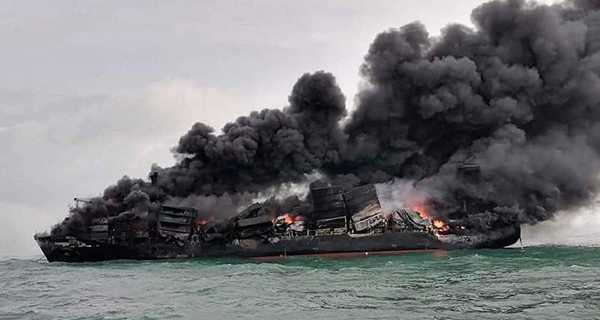Marine ecologists warn that the merchant ship that caught fire while anchored nearby to enter the port of Colombo after being denied access to two international harbors poses a serious threat to the survival of marine life.
According to a voluntary organization that advocates for the protection of Sri Lanka’s marine environment, only five percent of coastal disasters are caused by ocean pollution.
“That means 95% is in the sea. Now you can imagine that what we see is only five percent. Everything else can be found at sea. ”
According to Pearl Protectors Coordinator, Muditha Katuwawala, the longer it takes to remove the material, the greater the damage.
The MV XPress Pearl, which has been on fire since May 20, has been found in containers, plastic bags, water bottles, shopping bags, electrical cable insulators, etc., and plastic of various densities, affecting the country’s marine environment and coastline. Several types of pebbles had been washed ashore.
It has been revealed that the Express Pearl, which was sailing under the Singapore flag, had 1486 containers containing 25 tons of nitric acid and other chemicals and cosmetics.
The Indian Navy and Coast Guard have also assisted in extinguishing the ship’s fire for a week.
Pearl Protectors Coordinator Muditha Katuwawala points out that in the event of an oil spill on the ship, plastic particles mixed with water could have a severe environmental impact. However, he points out that there is no mechanism in place in Sri Lanka to minimize the damage caused by oil spills.
In the event of an oil spill, the fuel spreads to the surface of the seawater, preventing sunlight from entering the surrounding ocean, adversely affecting the marine life and ecosystem there.
“Then the fish, the aquatic life there, when the oil layer is covered, they get stuck there.” They can’t do anything. ”
The co-ordinator of Pearl Protectors pointed out that a fuel leak from the MV X-Press Pearl could cause severe damage to the surrounding seas, further affecting the port of Colombo as well as the port city and the Negombo fishing harbor, as well as the country’s economy. That a severe loss could occur.
“The situation is not good,” said Dr. Asha de Vos, a marine biologist.
“In short, the tide is flowing south. As such, more defective material could accumulate in Colombo and the Southern Province. The oil will float from Colombo to the north coast. ”
Dr. de Vos also posted on Twitter a prediction made by Charitha Pattiarachchi and Dr. Sarath Wijeratne, professors of the Department of Oceanography, Western University of Australia, to illustrate his point.
Printed shells emphasize the potential for damage to marine life, especially fish, by plastic pebbles washed into land by seawater.
He points out that the chemicals in the ocean are absorbed into the plastic cubes, and emphasizes that the particles that absorb such harmful chemicals are present not only off the coast but also in the ocean.
He added that eating such cubs could harm their health. He also warned of the potential crisis for the fishing industry.
Today, the media reported how several plastic cubes had died in the caramel of the fish.
Pointing out the importance of controlling the situation quickly, Muditha Katuwawala stressed that the plastic pellets were also dumped into the ocean during an accident in Hong Kong in 2012, and that the plastic pellets can still be seen on the beach in the area.
In 2012, a storm near Hong Kong caused seven ships to sink, six of which contained plastic (polypropylene) sheets.
Shortly after the incident, the dead fish were found floating in the sea, and tests revealed that a deadly amount of their stomachs had been filled with these plastic pellets.
Like any other small piece of plastic, these are at risk of entering the food chain and landing on people’s plates.
The coordinator of Pearl Protectors, Muditha Katuwawala, further stated that in addition to sea pollution, there is a risk of air pollution due to the ship that caught fire.
The Marine Environmental Protection Agency also warned of possible acid rain due to the X-Press Pearl’s fire.
Its chairperson Darshani Lahandapura had told the media that the nitrogen oxide emitted into the atmosphere could mix with water particles in the upper atmosphere, causing nitric acid or acid rain.
She added that such air currents could travel inland from the coastal areas, which could lead to acid rain in the surrounding areas.
The Marine Environment Protection Authority urges the public to be vigilant in this regard.
Accordingly, the Authority has further requested the public to avoid direct exposure to rain these days and to take steps to cover outdoor metal equipment as well as vehicles.
The marine ecologist pointed out that people should avoid touching the material, including plastic pebbles that have been washed ashore, and reiterated that plastic pebbles should be removed as soon as possible, otherwise they could spread further.
He pointed out that the current restrictions on travel in the country and the presence of chemicals among the washed ashore were obstacles to joining voluntary organizations to clean up the coast.
The MV X-Press Pearl, which has been on fire for the past 20 days, affecting Sri Lanka’s marine environment and coastline, has sought permission to enter two international ports to prevent damage at the first sign of danger, according to Splash. Has been revealed.
The captain of the ship, Tim Hart, executive chairman of X-Press Feeders, which owns the ship, said the ship had to enter Sri Lankan ports of Hazira and Hamad, Qatar, and asked permission to unload suspicious containers, but was denied permission by both ports. Had.
The 186-meter-long container ship, built in 2021, was launched under the Singapore flag.
